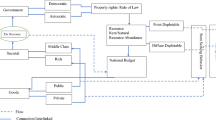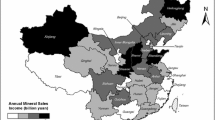Abstract
The paper analyzes the impact of natural resource abundance on selected governance indicators. We use a panel data set with observations on a large number of countries over an extended period of time and employ an instrumental variable technique to account for endogeneity. The results show that exports of natural resources have, above all, led to an increase in corruption. This result is robust to both different model specifications and an alternative indicator for natural resource abundance. For other governance indicators, such as law and order and bureaucratic quality, we either find no results or results that lack robustness.
Similar content being viewed by others
References
Ades, A., & Di Tella, R. (1999). Rents, competition and corruption. American Economic Review, 89(4), 982–993.
Alexeev, M., & Conrad, R. (2009). The elusive curse of oil. Review of Economics and Statistics, 91(3), 586–598.
Aslaksen, S. (2009). Corruption and oil: evidence from panel data. Mimeo (Working Paper). http://folk.uio.no/siljeasl/Corruption.pdf. Accessed 28 December 2010.
Aslaksen, S. (2010). Oil and democracy—more than a cross-country correlation? Journal of Peace Research, 47(4), 421–431.
Auty, R. (2001). The political economy of resource-driven growth. European Economic Review, 45(4–6), 839–846.
Barro, R. (1999). Determinants of democracy. Journal of Political Economy, 107(S6), 158–183.
Bhattacharyya, S., & Hodler, R. (2010). Natural resources, democracy and corruption. European Economic Review, 54(4), 608–621.
Blundell, R., & Bond, S. (1998). Initial conditions and moment restrictions in dynamic panel data models. Journal of Econometrics, 87(1), 115–143.
Brollo, F., Nannicini, T., Perotti, R., & Tabellini, G. (2010). The political resource curse. NBER Working Paper No. 15705, NBER.
Brunetti, A., & Weder, B. (2003). A free press is bad for corruption. Journal of Public Economics, 87(7–8), 1801–1824.
Brunnschweiler, C. (2008). Cursing the blessings? Natural resource abundance, institutions, and economic growth. World Development, 36(3), 399–419.
Brunnschweiler, C., & Bulte, E. (2008). The resource curse revisited and revised: a tale of paradoxes and red herrings. Journal of Environmental Economics and Management, 55(3), 248–264.
Bulte, E., Damania, R., & Deacon, R. (2005). Resource intensity, institutions, and development. World Development, 33(7), 1029–1044.
Clark, J. (1997). Pretro-politics in Congo. Journal of Democracy, 8(3), 62–76.
CSCW (2010). UCDP/PRIO armed conflict dataset, version 4-2009. Centre for the Study of Civil Wars (CSCW), International Peace Research Institute, Oslo (PRIO). http://www.prio.no/cscw. Accessed 2 May 2010.
EITI (2010). Extractive Industries Transparency Initiative. http://eiti.org/. Accessed 10 June 2010.
Escaleras, M., Anbarci, N., & Register, C. (2007). Public sector corruption and major earthquakes: a potentially deadly interaction. Public Choice, 132(1), 209–230.
Frankel, J. (2010). The natural resource curse: a survey. NBER Working Paper No. 15836, NBER.
House, Freedom (2010). Freedom in the world. http://www.freedomhouse.org. Accessed 10 April 2010.
Freille, S., Haque, E., & Kneller, R. (2007). A contribution to the empirics of press freedom and corruption. European Journal of Political Economy, 23(4), 838–862.
Garrett, T., & Sobel, R. (2003). The political economy of FEMA disaster payments. Economic Inquiry, 41(3), 496–509.
Gause, G. (1995). Regional influences on experiments in political liberalization in the Arab world. In R. Brynen, B. Korany, & P. Noble (Eds.), Political liberalization and democratization in the Arab world, Vol. 1: Theoretical perspectives (pp. 283–306). Boulder: Lynne Rienner.
Isham, J., Woolcock, M., Pritchett, L., & Busby, G. (2005). The varieties of resource experience: natural resource export structures and the political economy of economic growth. World Bank Economic Review, 19(2), 141–174.
Jütting, J. (2003). Institutions and development: a critical review. OECD Development Centre Working Paper 210.
Kaufmann, D., Kraay, A., & Mastruzzi, M. (2009). Governance matters VIII: aggregate and individual governance indicators, 1996–2008. World Bank Policy Research Working Paper 4978.
Leeson, P., & Sobel, R. (2008). Weathering corruption. Journal of Law and Economics, 51(4), 667–681.
Leite, C., & Weidmann, J. (2002). Does mother nature corrupt? Natural resources, corruption, and economic growth. In G. Abed & S. Gupta (Eds.), Governance, corruption, and economic performance (pp. 159–196). Washington: International Monetary Fund.
Natural Resource Charter (2010). The natural resource charter. http://www.naturalresourcecharter.org/. Accessed 21 December 2010.
PRS Group (2010a). About ICRG: the political risk rating. http://www.icrgonline.com/page.aspx?page=icrgmethods. Accessed 8 March 2010.
PRS Group (2010b). International country risk guide: political risk. http://www.icrgonline.com/default.aspx. Accessed 8 March 2010.
Ranjan, R., & Zingales, L. (2003). The great reversal: the politics of financial development in the twentieth century. Journal of Financial Economics, 69(1), 5–50.
Rodrik, D., Subramanian, A., & Trebbi, F. (2004). Institutions rule: the primacy of institutions over geography and integration in economic development. Journal of Economic Growth, 9(2), 131–165.
Ross, M. (2001). Does oil hinder democracy? World Politics, 53(3), 325–361.
Ross, M. (2009). Oil and democracy revisited. Mimeo (Working Paper). http://www.sscnet.ucla.edu/polisci/faculty/ross/Oil%20and%20Democracy%20Revisited.pdf. Accessed 12 December 2010.
Sala-i-Martin, X., & Subramanian, A. (2003). Addressing the natural resource curse: an illustration from Nigeria. NBER Working Paper No. 9804, NBER.
Sachs, J., & Warner, A. (1995). Natural resource abundance and economic growth. NBER Working Paper No. 5398, NBER.
Serra, D. (2006). Empirical determinants of corruption: a sensitivity analysis. Public Choice, 126, 225–256.
Shughart, W. II (2011). Disaster relief as bad public policy. The Independent Review, 15(4), 519–539.
Treisman, D. (2000). The causes of corruption: a cross-national study. Journal of Public Economics, 76(3), 399–457.
Treisman, D. (2007). What have we learned about the causes of corruption from ten years of cross-national empirical research? Annual Review of Political Science, 10(1), 211–244.
Tsui, K. (2011). More oil, less democracy: evidence from worldwide crude oil discoveries. Economic Journal, 121(151), 98–115.
UNCTAD (2010). UN COMTRADE database. http://comtrade.un.org/. Accessed 2 April 2010.
Vicente, P. (2010). Does oil corrupt? Evidence from a natural experiment in West Africa. Journal of Development Economics, 92(1), 28–38.
Windmeijer, F. (2005). A finite sample correction for the variance of linear efficient two-step GMM estimators. Journal of Econometrics, 126(1), 25–51.
World Bank (2005). World development report 2006: equity and development. New York/Washington: Oxford University Press/World Bank
World Bank (2010). World development indicators. http://data.worldbank.org/data-catalog. Accessed 30 April 2010.
Author information
Authors and Affiliations
Corresponding author
Rights and permissions
About this article
Cite this article
Busse, M., Gröning, S. The resource curse revisited: governance and natural resources. Public Choice 154, 1–20 (2013). https://doi.org/10.1007/s11127-011-9804-0
Received:
Accepted:
Published:
Issue Date:
DOI: https://doi.org/10.1007/s11127-011-9804-0




